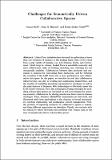Challenges for semantically driven collaborative spaces

View/
Date
2016Author
Molli, Pascal
Breslin, John G.
Vidal, Maria-Esther
Metadata
Show full item recordUsage
This item's downloads: 318 (view details)
Recommended Citation
Molli, Pascal, Breslin, John G., & Vidal, Maria-Esther. (2016). Challenges for semantically driven collaborative spaces. Paper presented at the Semantic Web Collaborative Spaces: Second International Workshop, SWCS 2013, Montpellier, France, May 27, 2013, Third International Workshop, SWCS 2014, Trentino, Italy, October 19, 2014, Revised Selected and Invited Papers
Published Version
Abstract
Linked Data initiatives have fostered the publication of more
than one thousand of datasets in the Linking Open Data (LOD) cloud
from a large variety of domains, e.g., Life Sciences, Media, and Government.
Albeit large in volume, Linked Data is essentially read-only and
most collaborative tasks of cleaning, enriching, and reasoning are not
dynamically available. Collaboration between data producers and consumers
is essential for overcoming these limitations, and for fostering
the evolution of the LOD cloud into a more participative and collaborative
data space. In this paper, we describe the role that collaborative
infrastructures can play in creating and maintaining Linked Data, and
the benefits of exploiting knowledge represented in ontologies as well as
the main features of Semantic Web technologies to effectively assess the
LOD cloud’s evolution. First, the advantages of using ontologies for modelling
collaborative spaces are discussed, as well as formalisms for assessing
semantic collaboration by sharing annotations from terms in domain
ontologies. Then, Semantic MediaWiki communities are described, and
illustrated with three applications in the domains of formal mathematics,
ontology engineering, and pedagogical content management. Next,
the problem of exploiting semantics in collaborative spaces is tackled,
and three different approaches are described. Finally, we conclude with
an outlook to future directions and problems that remain open in the
area of semantically-driven collaborative spaces.

